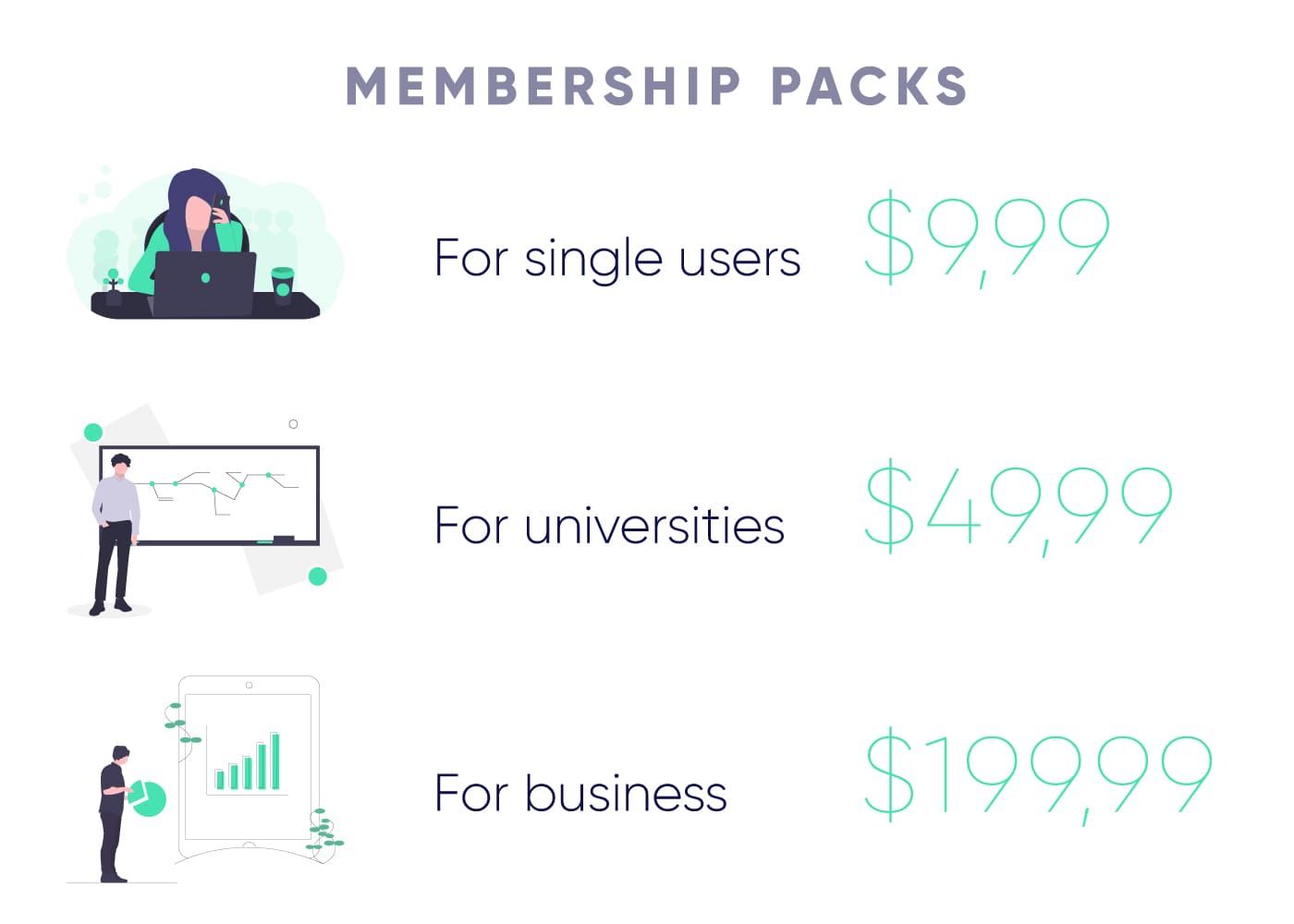Education has always been one of the most important parts of society. For this reason, the education industry is the one that uses technological advancements as soon as they appear and continues to develop in real world and online. If you have no information on how to start an online school, but want to create a high-quality digital educational establishment, read this article for valuable insights and directions.
Introduction to the e-Learning Market
The size of e-learning market shows constant growth, and according to Statista forecast, it will surpass 243 million U.S. dollars by 2022.

This statistics tells that all kinds of online schools are in demand and this article will help you to come up with a clear picture of what qualities and distinguishing features your e-learning establishment should possess. To make your idea a profitable reality you need to consider many aspects like business model, main and additional ways of monetization, brand identity, functionality, and a lot more. Check out all these aspects below.
Reasons to Start an Online School

Online education market growth is already a valid reason to create an online school, but it wouldn’t be a waste of time to consider other reasons as well.
1. Simplified monetization. The online education business field does not require complex monetization models to make e-learning profitable. Depending on the type of the online institution, students can pay for attending certain classes, participating in webinars and conferences, etc. As an additional monetization, when starting an online school, you can place ads relevant to your course field or the ones that promote your business partners.
2. Minimized funding. To start an online school or open an online academy, you don’t have to seek placement, furniture, equipment and other important stuff for your classroom. Of course, you’ll need funding on development services and special equipment like server and cloud solutions, but you will spend resources on it once, instead of dealing with payments every month. In addition, many education related software offer less expensive membership packs for educational establishments than for business owners.

3. Bigger number of students. An offline educational institution has limitations on the number of students and their geography. In case if you intend to create your own online school that will be a host for hundreds or thousands of students, you need to build a highload platform, especially if you’re planning to host online conferences and webinars. Once you manage to get many talented and experienced teachers on board of your educational academy the number of people willing to study on your courses will constantly grow. The only thing you’ll need is a system that can handle large volumes of requests and traffic.
4. Convenience for teachers. Online education is convenient for both sides of the learning process, because once you start an online school, teachers and learners don’t need to spend time on the road, and they deal with most convenient education formats. Teachers don’t need to be present at all classes, because they can create videos for separate lessons, or even for the entire course. To start online classes that would become most popular and profitable you need to consult with at least 2-3 teachers who have years of experience and progressive thinking to know what teaching format is most efficient and convenient.
5. Reaching worldwide audience. You may not start with something big, but once you start an online university or other educational business institution and see that it steadily gains popularity, you might want to cover other countries. It is a lot easier to do if you have e-learning courses instead of a traditional institution that requires tenancy or real property purchase. Online schools face a lot less bureaucracy than traditional ones, because they just need a system flexible to time and culture differences, and, most important, easy and safe payment processing.
6. No limits on the field of expertise to teach. Another valid reason to start your own online school is the fact that you have no limits on fields and topics for your courses’ content. You may teach economy and psychology along with calligraphy and front-end development using one e-learning platform for all. In case if some course resulted in a failure, you can painlessly replace it with an absolutely different one that correspond to labor market demands and trends. Of course, if you want to fully replace a course with something new that requires radical lessons’ format change, you need to make both server and client sides of your system flexible to such changes, otherwise you’ll very likely need an absolutely new platform architecture, which is more time and money taken away from you.
7. The possibility of Artificial Intelligence implementation. Machine learning has already found its way into the field of education, and one of our case studies for this industry is a proof. It is possible that in the near future human teachers will be replaced with intelligent bots. Chatbots are already used by companies to train their managers to communicate with clients, and with the speed of machine learning evolution, soon bots will be an inevitable part of the e-learning process.
8. Maximum automation. Nothing is more beneficial in the idea to open an online academy than the possibility to make it fully or at least mostly automated. Of course, this will require significant expenses on development, because such systems demand advanced technologies and top development experts. However, you need to weigh up the pros and cons of having a fully automated system, because a human touch is very important in traditional and online education. Only a human will notice if something goes wrong and the student does not understand the material and gives correct answers only when mindlessly learns it by heart.
What Online Education Business Model to Choose

- Subscription. This business model is classic and the most efficient one, because you can fully control students’ access to your knowledge base. Subscription is a good way to monetize your e-learning platform, because you can offer membership packs with different sets of features and cover all layers of your target audience from separate individuals to large companies.
- Webinars. For the last few years, webinars gained popularity and in the future will be even in a bigger demand. Webinars may not be the most efficient as a business model, but they surely bring good profit when backed up with good-quality technology. You need to be sure that your platform can handle high load and force majeure circumstances when a speaker cannot be present on your studio and you need to be a livestream link between them and the audience.
- Pay for certificate. Some e-learning services after starting an online school use an interesting education business model that implies giving users access to the studying material for free and charging for certificate only. This model has flaws, because when companies consider a new job candidate, they often see whether this person has knowledge instead whether they have a document that officially supports this knowledge. Thus, you may face a problem when the vast majority of your online students will use your service for free. If you’re interested in this business model, you better think of additional ways for getting enough profit.
- Live classes. If you'd like to start an online school and see your future online education platform as a place where teachers hold classes in real-time mode, you will very likely pay more attention to this business model. Also, this model is popular among teachers who give lessons by themselves and don’t need a complex online education system to fulfill their needs. Such small business owners commonly choose ready-made solutions, because they have limited time and budget.
- Videos as lessons. This online education business model has its particular qualities, but it doesn’t require real-time mode lessons and having teachers on a regular basis. A huge amount of work must be done in the beginning, but on the other hand, once work on the course writing is finished, you only sell it instead of creating it again and again. This model is suitable for businesses of all sizes and gives unlimited opportunities on the knowledge fields for your online classes.
- Multi-model. An e-learning platform with a combination of different business models is always more beneficial than a one-model service. By giving people an option to choose a course format that fits them best, you can increase brand loyalty and client satisfaction. Also, you will be able to cover bigger audience by offering different approaches to the studying process.
Building an Online School: Step by Step, Brick by Brick

Having at least basic understanding on how to create an online school is important for building a successful and profitable platform. Below are the main and vital steps you need to make to build not just another website, but a fully-functional online education platform.
1. Name and brand identity
The first thing you need to do after you got the idea to start an online college or any other digital education establishment, you better come up with a good name of your platform. If you want the application to be successful, it must be:
- Short;
- Simple;
- Catchy;
- Memorable.
The same refers to your domain, because your web address should be as close to your online school’s name as possible.
Brand identity is as important as a name, so your e-learning service will require:
- Logo;
- Brand color scheme;
- Font;
- Slogan.
All these parts of your corporate identity must be in a harmony with each other and represent your business idea.
2. Research on competitors
This step doesn’t relate to the actual development process, but is more of a prelude to it. Even if you think that your idea and vision on your future online institution is brilliant and one-of-a-kind we still strongly advise to research your competitors. It is very important if you'd like to succeed and determine how to start an online school that people will love. First, you will find their strong and weak spots. Second, you’ll make sure that your idea wasn’t used before by someone else, and if it did you can see whether it was successful or not so much before spending your time and money.
3. Trends and audience targeting
With the help of modern technologies you can easily access information on current and future trends to make a decision what audience to target. The variety of statistical and analytical platforms can give you information on expectations and preferences of different social layers and give you this information in an easy to understand format. To make your service profitable you need to come up with a specific unoccupied niche or target general audience, and to do this you need to have enough information on the market. Otherwise, the idea of starting an online school may be doomed to fail.
Do your research, and then research some more to get a desirable reward!
4. Ready-made solution vs. your own customized platform
Depending on the result you want to get, you need to choose what option would fulfill your needs - use a ready-made solution or develop a unique system fully customized and flexible to possible changes. Online course builders like Teachable are great if you have limited budget and cannot afford waiting for few months of development. However, using them will make your service not “one-of-a-kind”, but “one-of-many”. In addition, using such builders is no good for brand identity, because people may think that if you saved money on development, then you’ll also save money on the quality of your education.
5. Choosing your team
One person cannot do all work by themselves to start an online business school or other educational establishment. They can, but the process will be long, hard and very likely will result in a failure. If you wonder how to start an online school that will become a top-quality platform you need to find a professional team that will provide you with the variety of web app development services. Luckily, today there are plenty of companies and individual specialists who can provide you with different kinds of custom software, but you need to be sure that your online school is created by experienced specialists. You can ask them to show you their case studies and see whether they are skillful enough to work on your project. The same advice goes to your marketing team as well, because each new platform needs a smart promotion campaign.
6. Working on UI/UX Design
Today, web design has moved away from the idea of a pretty picture to good user experience. A perfectly balanced combination is especially important for online courses, because your web application design shouldn’t distract teachers and students from the learning process. Design of your online school must be eye-pleasing and give clues to all users where to intuitively click or tap to get what they need. Design is very important for your educational platform, so leave it to the hands of a professional.
7. Choosing main functionality
The main functionality set is more or less common for all online courses and includes:
- Profiles;
- Dashboards;
- Registration forms;
- Cards with lessons and assignments;
- Video and presentation;
- Live broadcasting;
- Comment section;
- Tools for rating and evaluation;
- Search;
- Payment;
- Social media integration;
- Alerts and notifications;
- Other.
Even if you’ll forget to include some functionality in the scope of work, if you’re working with a good development team, they will advise you to add missing parts.
8. Adding handy features
People often confuse features with functionality, which brings plenty of misunderstanding. Features are improvements for the website’s functionality and they are not obligatory for a site to possess. Features are important, because they differ and make online schools not to look like clones. Your features may be:
- Additional payment options;
- Profile badges;
- Search filters;
- APIs;
- Interactive elements;
- Popups and other notifications
- And a lot more, depending on the type of your online platform.
9. Quality testing and bug fix
Never underestimate the importance of quality assurance, especially when it comes to web application development. A quality assurance specialist has critical thinking and will check your service not only for bugs and malfunctions, but also for its security vulnerability. The more complex architecture of the application, the more a QA specialist is required. Since a web application is usually created by more than one person, there might be gaps and inconsistencies, and the more people work on one system, the higher possibility of bugs to appear. You can read plenty of real stories with one thing in common - bugs that affected functionality. Since you’re very likely don’t want a system with a non-working payment or registration page, make sure that your development team includes at least one QA engineer.
10. Online school launch
Launch of an e-learning platform is not a finish, but is only a beginning of a business journey that may be filled with system adjustments, promotion, changes on the market, etc. The online education market continues to grow and the number of strong competitors grows with it. This means that after you start an online high school or some other e-learning service, you’ll need to be flexible to all kinds of changes like adding new features, replacing functionality set or making the entire service automated.
11. Advertising and promotion
Even the brightest ideas fail without a good-quality marketing campaign, so you need to make sure that your e-learning service is in the hands of professionals. Depending on the type and scale of your platform as well as on the type of your target audience you will need to work or at least consult with:
- Marketing expert;
- SEO manager;
- PPC specialist;
- SMM manager;
- Copywriter
to successfully promote your educational website or application. However, you need to keep in mind that your service will benefit if you find marketing and SEO specialists on one of the early stages of development so they let you know what exactly must be included in both back-end and front-end sides from the start. Otherwise you’ll need to add these things after the product launch, which may result in additional costs, system malfunctions, etc.
12. Mobile application
Having a mobile application in addition to the existing web app is a big plus for your business, especially if your competitors don’t have any. Mobile applications may result in additional expenses in the beginning, but when developed wisely as a solid service popularity booster it can open new monetization horizons for your e-learning platform. A top-quality mobile application increases brand loyalty, so you can use this knowledge to benefit financially.
In addition, you can increase interactivity of your educational platform by turning some courses or lessons into a game. This works great in the field of studying foreign languages, because interactivity helps to activate parts of brain, which improves the quality of memorization.
When your project will be on the stage of choosing a development team, you will benefit if the one you hire also provides the variety of mobile application development services.
Conclusion
Starting an online school is always a noble idea, because it is an attempt not simply to make money, but to make this world better by giving people a real opportunity to study something they’re interested in to provide for themselves and their families.
To make this good deed profitable for you and/or your company and well as fulfill needs of your clients (aka students) it must be of a top quality otherwise plenty of time, money and expectations will be wasted for nothing. Modern technologies give you and all startup owners an access to limitless opportunities by making the world of software development more comfortable than ever before. However, without professional guidance and services you may not unlock potential that would help you to become a giant in the field of online education.
The number of tips in this article is just the top of the iceberg, because one-size-fits-all solutions do not exist in the business world. Only knowing what idea and expectations on the result you have in mind can give a clue what to recommend in your specific case.
The only thing we can tell you for sure is that the more experience your developers have the better online school you will get in the end of their work. You can rely on development amateurs, because their work costs less, but these money spared may result in delays and more expenses from you. It may even ruin reputation of your brand if there will be serious software malfunction. So, we strongly advise you not to try to save money on software development and choose a company that knows how to start an online school, has years of experience, good portfolio and offers complex solutions. If you’re looking for such company, then look no further and contact us right away.





